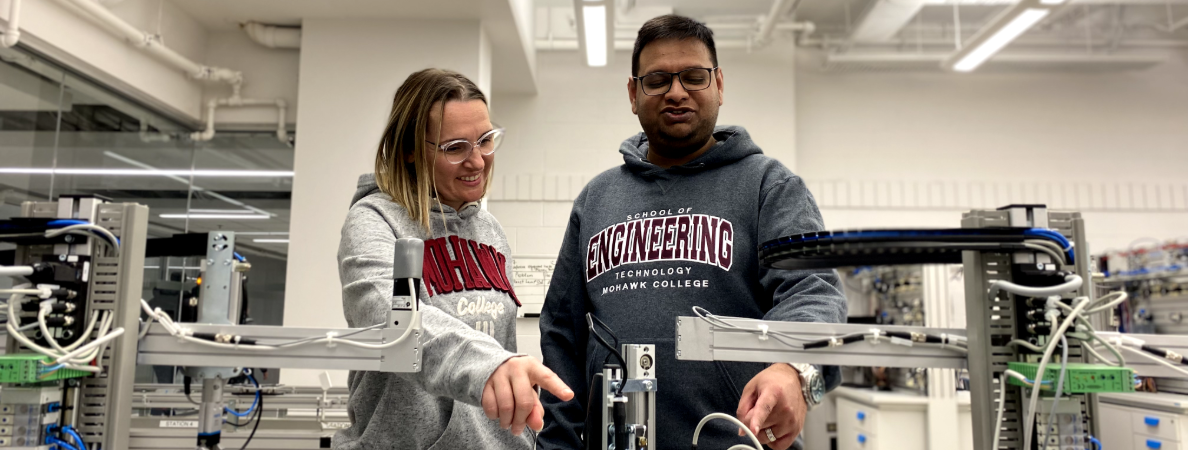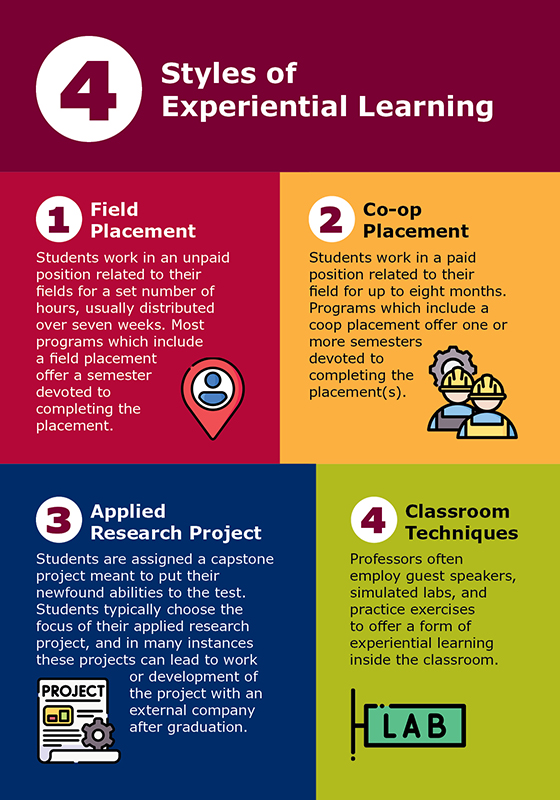
When it comes to learning, theory and information can only take you so far. Whether it’s taking the step between high school and college, or preparing for your first real job after graduating, it can be quite a big step between learning how to do something and actually doing that thing in the real world. Fortunately, experiential learning exists to bridge that gap by putting students into positions where they can learn and make mistakes. Whether you’re a student in a field placement looking to learn how to do their job before they start their careers, or a prospective student looking to learn about the college experience through events like Open House, experiential learning has something to offer everyone.
Hands-on learning is a flexible medium where students and teachers can take multiple different approaches to learning. Paula, a student in the Journalism program at Mohawk College, is currently completing her field placement as part of her program. “My placement time is 248 hours. I am doing my placement right now since it's my last semester. I am in the radio station,” she said. “I have a podcast for international students. The podcast is Arrival's Lunch. It's made by international students for international students, and for everybody else to hear how about the international student experience. I will also be starting a new podcast on March in Spanish.”
Through her program, and entire semester is dedicated to Paula’s unpaid placement, where will spend 248 hours working over 7 weeks. According to Paula, this experience is valuable specifically because of the freedom to make mistakes. “I’m really enjoying my placement because I like to live this kind of experience. It's the real-world side to knowledge, I don’t just open a book, I go to the radio station, speak as much as I can and I’m actually in the real world a little bit,” she said. “I can make mistakes right now. Because I'm still in the school, it's the perfect timing for me to make mistakes, I still have teachers or other people who can provide feedback.”

While Paula is currently completing her field placement, students in other programs are exploring different forms of experiential learning. Nish, a student in the x program, is currently hard at work completing his applied research student, a project designed to challenge students to put all of their skills and knowledge to the test in a culminating project which can have real-world applications.
“My favorite part of the program right now has to be working in the applied research project. I'm having a blast applying all the skills I've learned in a very practical setting,” said Nish. “We recently were featured by CHCH News for our project, and we're working with the Canadian Air Force Museum to recognize objects, images, and especially aircrafts.”
He continued, “It feels very rewarding, and it's been a great experience because you can see the impact it's going to make after two or three years when this project is completed. We will be able to preserve the memory of the World War two era and our heroes who fought for us to protect us. It's been an incredible project for me and the favourite part of my Mohawk College journey.”
While he’s currently getting hands-on experience through this applied research project, Nish has been able to engage in other forms of experiential learning through his program. “I've had multiple hands-on learning opportunities,” he said. “The first one, after my third semester, I got an eight-month coop where I got to work for a company named Procore Limited. I worked as a full stack developer, mostly specializing Java, and I got to learn things that I wouldn't have learned in a traditional classroom setting.”
His work experience extends to departments within Mohawk College as well, taking advantage of the student employment opportunities offered on campus. “My next job was when I started working as a Campus Student Employment Program (CSEP) student at Mohawk, for Alternative Learning Services (ALS) department. I used to create documentations and run around the college understanding how we can improve the accessible learning services offered by the college.”
While not every program has built-in experiential learning opportunities, professors go above and beyond to bring valuable industry experience directly into the classroom. “We didn't have any coop experiences, though the professors really tried to bring the experience into class,” said Blen, a student in the Journalism program at Mohawk College. “I remember a number of our professors bringing in guest speakers during our class to talk about their experiences. These are people directly from the industry, from the corporate world, from wherever that's relevant for the course, they would be bringing in those people to talk about their experiences and for students to ask questions.”
She continued, “Even though it's not a coop approach, it still helps us connect with what we're learning theoretically to really see, ‘okay, but in the real world, how does this work? How were you able to navigate X, Y, and Z?’”
Even when there aren’t guest speakers, professors take lengths to make sure that the lesson is more than just a lecture. “They have different approaches of going about it, like role plays. It's not your typical classroom situation where you're just sitting down and you're jotting and the teacher is teaching and then they're leaving,” she said. “It has to do a lot with making sure you really understand the concept of it. It's not really about the theory, but, ‘do you really comprehend it?’ And they really try to make sure it’s engaging, it could be presentations, it could be role plays, it could be fun activities, it could be online or offline. It's flexible.”
Looking back on the experience he has gained, Nish feels prepared to tackle whatever the future holds. “How did it help me? I was not only coding, I was not only making documentations, but I was also interacting with people and finding solutions to problems that really existed. I definitely feel very well equipped to enter the workforce,” he said. “If I compare myself from the first semester to now, I feel I have a solid idea of what I'm going to do. I have a path, I have a roadmap for what I want to do, I see possibilities and I know how to get there. At first, I did not know how to get there, but now Mohawk College has equipped me.”




